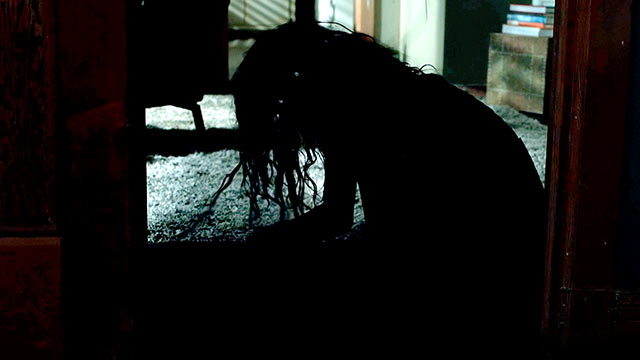
Lights Out represents something that horror movies have seemingly forgotten about: tell a story, keep it interesting, and don’t worry about trying to reinvent the wheel. Modern horror films seem to be so worried about leaving their indelible mark upon the genre that they often sacrifice the fundamentals that make a horror movie enjoyable.
Lights Out, based on the 2013 short film of the same name from original director David Sandberg, follows estranged mother and daughter, Sophie (Maria Bello) and Rebecca (Teresa Palmer), as they vie for the safety of Martin (Gabriel Bateman), Sophie’s son and Rebecca’s brother, after the death of Sophie’s husband. Martin, has been falling asleep in class. So much in fact, that’s CPS (Child Protective Services) wanted answers. After failing to reach Sophie, Rebecca is eventually contacted and chalks Martin’s behavior up to her mother’s out-of-control depression and otherwise erratic behavior that has been the wedge in their relationship over the previous years. Rebecca soon discovers that Martin has been plagued by visitations from an entity that can only exist in the dark and the two, along with the help of Rebecca’s boyfriend start seeking answers in a bid to save their own lives.
Now, the audience has been clued into the supernatural origin of the creature from the first scenes, so although we are unraveling the mystery of what where and who the creature is, there is no doubt that we are dealing with something “unnatural”. It’s this undeniable fact that makes every scene with the “creature” work so well. Horror is an emotion steeped in the darkest recesses of our psyche. It lives in that darkness and the audience knows that it is only a visitor there watching the events unfold, under that darkness’s generosity and at any time our invitation can be rescinded. Lights Out builds its premise on that and thoroughly delivers by keeping things simple when they need to be.
Lights Out keeps the story small. With 4 major characters we get to know our key players quickly and the drama, when there, makes sense. The characters here move with purpose and enough cliches are avoided that we genuinely put stock in their well-being. This all works to sell the scares, which are numerous and well-played. Well played so much, in fact, that this one is definitely one to be seen in the theatres. The jump scares (yeah, yeah, I know) rarely seem peppered in just to play to the hidden camera trailers so abundant in the film’s marketing campaign, and more instrumental in moving the action forward. It’s forward momentum is as integral as its scares in elevating Lights Out from typical summer horror cash-grab to a solid Saturday night piece of bloody and well executed horror entertainment. RECOMMENDED.


